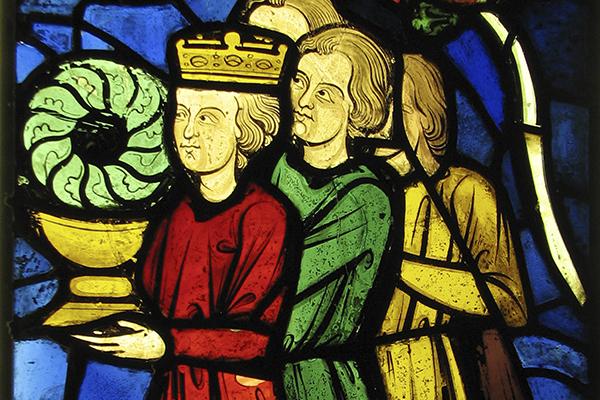
“King Louis IX Carrying the Crown of Thorns,” stained-glass, c. 1245-48; Metropolitan Museum of Art/Open Access
“Have a tender pitiful heart for the poor, and for all those whom you believe to be in misery of heart or body, and, according to your ability, comfort and aid them with some alms."
By Dr. Joe McAleer
It goes without saying that saints live extraordinary lives. Many are known for a single attribute, such as holiness, wisdom, or courage. Then there are those with an embarrassment of riches: loving father; benevolent king; just lawgiver; brave crusader; friend of the poor; dispenser of mercy; defender of the faith.
Such was St. Louis IX of France (1226-1270), whose feast we celebrate on Aug. 25.
Louis is the only French king to be declared a saint, a model Christian monarch. With boundless energy and deep piety, he brought peace and prosperity to his kingdom, with a keen determination to administer justice at all levels of society, especially among the poor.
“Have a tender pitiful heart for the poor, and for all those whom you believe to be in misery of heart or body, and, according to your ability, comfort and aid them with some alms,” Louis advised his son and heir, the future King Philip III.
Maternal influence
Louis succeeded his father, King Louis VIII, when he was 12, but his mother, Queen Blanche, ruled in his stead until he was of age. She was a good influence, impressing upon young Louis a strong sense of duty and a deep love for God and His Church.
We know a good deal about Louis from his friend and biographer, Jean de Joinville. Joinville’s memoir is filled with telling stories and exchanges. At one point, the king asked him, “What is God?”
“That which is so good that there could be nothing better,” Joinville replied.
“Well said. Now tell me, would you rather be a leper or commit mortal sin?”
“And I, who never tell a lie,” Joinville wrote, “answered, ‘I would rather commit thirty mortal sins than be a leper.’”
Wrong answer. Louis upbraided his friend, recalling the words of his mother: “I love you, my dear son, as much as a mother could love her child; but I would rather see you dead at my feet than you should ever commit a mortal sin.”
Louis’ personal piety, fidelity to Rome, and intolerance of blasphemy and clerical abuses were renowned, with contemporaries calling him the “monk king.” He invited the future St. Thomas Aquinas to court, famously observing the young friar lost in thought during supper. When Thomas jumped from his place in a eureka moment, having solved a vexing theological question, Louis summoned his scribes, eager that they record Thomas’ thoughts, lest they be forgotten.
Love for the poor
Louis is also remembered for his legal reforms. He was determined to root out corruption and promote a fair administration of justice at all levels. “If a poor man have a quarrel with a rich man,” he wrote, “sustain the poor rather than the rich, until the truth is made clear, and when you know the truth, do justice to them.”
In one instance, a count who had hanged three children for hunting rabbits in his woods was tried and sentenced to death; Louis spared his life and instead imposed a heavy fine, which was given to charity.
He took part in two crusades to liberate the Holy Land. En route, he acquired relics of Christ’s Passion, including the Crown of Thorns, constructing the magnificent Sainte-Chapelle in Paris to showcase it. It is no wonder he is the patron saint of architects.
Guard and protect
Louis and his queen, Marguerite, had 10 children, and his descendants ruled France until the fall of the monarchy during the French Revolution. His parting words to his son, Philip, made prior to his death on Aug. 25, 1270, exemplify every parent’s hope for their child:
I give you all the blessings which a good and tender father can give to a son, and I pray our Lord Jesus Christ, by His mercy, by the prayers and merits of His blessed Mother, the Virgin Mary, and of angels and archangels and of all the saints, to guard and protect you from doing anything contrary to His will, and to give you grace to do it always, so that He may be honored and served by you.
Saint Louis IX, pray for us!
{shopmercy-ad}
















